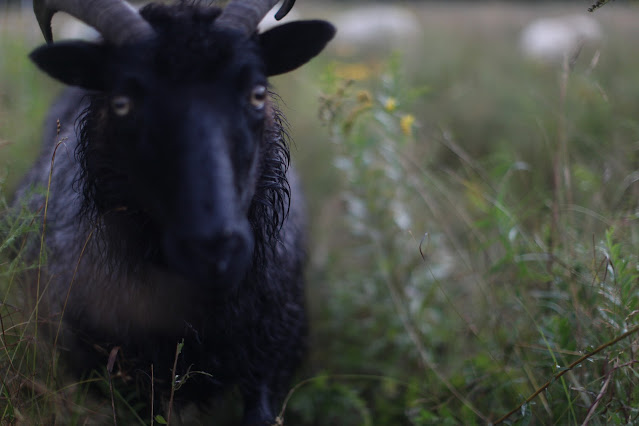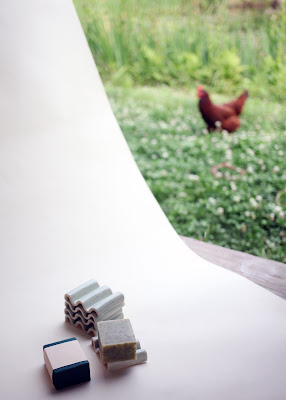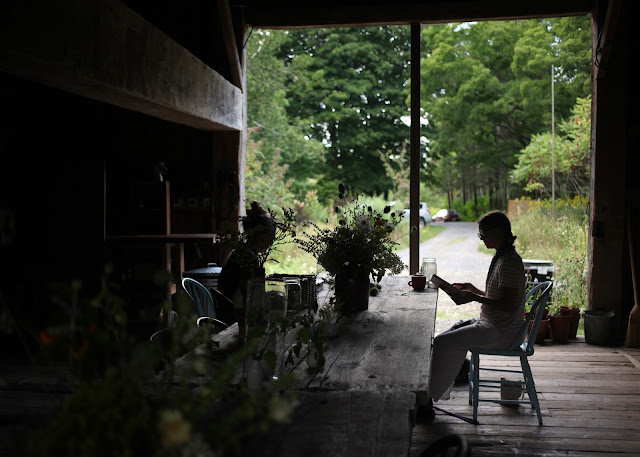There is a story I tell on farm tours and in interviews about a sweater my mom made for me from my favorite sheeps wool. (Gracie pictured above.)
Said sweater is black-ish made entirely from my favorite ewes wool, Gracie, RIP. I say black-ish because wool tends to bleach in the summer, just like hair can, so often black sheep go a bit brown-gray at the tips. They also grey with age, and so the color of this sweater - with it’s wool spanning three years of shearings - cannot be said to be pure black.
The wool was washed in the bathtub with fleece soap. Line dried, and then brushed out in long strips in order to get all the fibers going in the same direction. This creates what’s called ‘roving’ which you take to a spinning wheel. The wheel twists the individual fibers together making threads. Then you take the threads (three in this case) and twine them together to make yarn (3-ply in this instance - thus the heft of the sweater, though 2-ply is also common).
The sweater weighs about 2 pounds. It’s a simple crew neck, and 3/4 sleeves so I can work in it without getting my sleeves in muck or water troughs. Because it is so thick and heavy, it feels like armor when I wear it. It collects bits of hay and seeds; so I begin to resemble a barn sheep in winter.
We’re animals enmeshed.
It took a little more than three years to make, and remains one of the most valuable objects I own. Here it is, last night on my way to chores:
So how might we imagine putting a price tag on this item? Even before all of Susan’s labor, there was the labor of Eric and Zoe (shepherding during that time) caring for the sheep, moving their fencing every 3 days to new pasture, feeding hay in winter. We could add up the price of their labor, the cost of hay per sheep, the cost of various infrastructure and the diesel fuel used to maintain pasture. Gracie herself was a purchase way back in the very beginning of my time as a shepherd I paid $450 for her. If I loosely add up a handful of numbers we get a price tag somewhere in the realm of $13,000 for the sweater.
Of course most sweaters are not made this way. They are made in huge batches, using machines all along the way - machines from shepherding (moving sheep with drones) to the knitting machines of clothing factories.
When we start to unpack how we might get a $45 wool sweater in this world we might see that there is always exploitation lurking behind some part of the process. Some person, animal or environs were stripped of comfort, dignity or health in the process. This is the nature of profit, of wealth accumulation. I’m so tired of hearing about sustainable profit and responsible growth in ‘green businesses.’
‘World-building’ for me is creating a tiny eddy off of the main whirlpool that is contemporary life. It starts with untangling some of the threads of our basic needs (food, clothing, shelter, socialization). And centering the work of being in relationship; between me and my sheep, the sheep and the pasture, the sheep and the parasite load…between me an my fellow farmers, my parents. This work doesn’t have monetary value.
‘World-ing’ in this way of agricultural practice, or land-based business creates a liminal space where I can have one foot in the old world and one foot in a new world. The process of having your legs split on two unconnected rafts, and trying to balance is how I feel all the time, and this is my work and it will be likely for the rest of my life.
However, Saipua is not a farm business - this is a soap and floral company. The lines are blurred now that Saipua is fully integrated into Worlds End Farm. I have not spent enough time marketing soap these last few years. Partially because I’m busy being the manager of the farm, attending to livestock, hosting and cooking for visitors, etc. My priorities have been building Worlds End, but if we don’t have a business that supports the farm, we don’t have a place to have these conversations, and to do this work of world-building.
Compromise has always been incredibly hard for me. I divert so quickly to all-or-nothing thinking. But this summer I had to face the hard decision of selling my sheep and letting staff go in order to keep from having to sell Worlds End. So many sleepless nights and then waking up to cook our beautiful food for visitors who were in awe of our work. A burned out, exhausted farm staff, paired with wide eyed exuberant visitors. An ecosystem out of balance (and eerily reminiscent of when I shut down The Castle, our floral studio in Red Hook Brooklyn.) Part of me feels ashamed writing this, but I think a larger part feels it’s important to share with those of you have followed along and supported us or are struggling with similar problems…

So here I am again, re-organizing and telling you about it. In farming - especially with livestock, I always say the farmer has to come first. In other words, the farmer has to be healthy and functioning in order to take care of any animals (this comes up especially in times of crisis such as dealing with sick or dying animals…it’s essential to maintain perspective.)
Four of us manage this farm and business (Susan, myself, Mark and Kim). People visit and wonder where all the staff is, a testament to the amazing efficiency of our team but an indicator of how understaffed we are. Two weeks ago I made the difficult decision to end our public season early - closing Coyote Cafe and our cabin stays - in order to focus on restoring our health and sanity.
I have to commit to selling more soap and floral work so I can fund the work of the farm experiment. So I’m asking you, dear reader - Do you need soap? Or, are you or your friends hosting an event in the Hudson Valley and in need of floral arrangements? Do you have any ideas about how to operate a family business from your home in the current era of late stage capitalism? If so, email me.
Thank you always for following …and for your thoughts, words of encouragement and criticisms. I’m going to start pushing soap like a good little capitalist while continuing my work of worlding at Worlds End, endlessly searching for the portal which might deliver us into something new.





